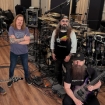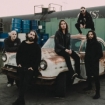Shop for Revolver-exclusive vinyl — including Dream Theater's The Lost Not Forgotten Archives - Images & Words, Live in Japan, 2017 (cobalt 2LP) and The Lost Not Forgotten Archives: A Dramatic Tour Of Events - Select Board Mixes (apple red 3LP) — via our store. Quantities are extremely limited — order now before they're gone!
In July 1992 Dream Theater released their second full-length, Images and Words. The album — their first with new singer James LaBrie teaming with the virtuosic crew of guitarist John Petrucci, keyboardist Kevin Moore, bassist John Myung and drummer Mike Portnoy — was a straight-up prog-metal opus that catapulted the band to international fame.
Much of the album's hype was generated by its hit single "Pull Me Under" — an emotive ripper that broke into the Top 10 of Billboard's Mainstream Rock chart, received significant MTV play and would later find new life as a fan favorite in the Guitar Hero World Tour game. Three decades since its release, Images and Words still ranks as Dream Theater's most commercially successful album and continues to garner critical accolades. (Guitar World listed it among the top guitar albums of 1992 and Rolling Stone picked it as one of the 100 Greatest Metal Albums of All Time).
Images and Words — which is showcased on Dream Theater's new live record, The Lost Not Forgotten Archives - Images & Words, Live in Japan, 2017 — is also a pivotal record for many of our favorite players, including Periphery guitarist Mark Holcomb.
Below, Holcomb tells the story about how he discovered Dream Theater, explains why Periphery's tour with John Petrucci and Co. was a game-changing "turning point" for him and more.
TELL US THE STORY ABOUT HOW YOU FIRST DISCOVERED DREAM THEATER.
MARK HOLCOMB Funny enough, the first time Dream Theater appeared on my radar was when I used to browse through tab books in my local guitar store back in the mid 90s. I'd always see the tab books for Awake and Images and Words, but I never thought to give the music a listen since, at the time, I was so obsessed with Metallica, Pantera, Megadeth and so on. I guess I didn't have the bandwidth to check them out at first. I eventually caved and bought Falling Into Infinity. While I didn't quite connect to it fully, the solos blew me away. I came to find out that that record was a drastic stylistic departure for them, and once I checked out their previous several records, I started to really fall in love with the music and get why this band was revered.
DREAM THEATER'S 1992 ALBUM IMAGES AND WORDS IS WIDELY REGARDED AS A PROG-METAL CLASSIC. TELL US THE STORY ABOUT THE FIRST TIME YOU HEARD IT.
The first two songs I heard were "Another Day" and "Under a Glass Moon," probably off of a friend's CD collection in the 90s. My first impression was that the songs were cool, the singing was accessible and far different than the other styles of music I liked, and the guitar playing was just game-changing — so much so, that I wasn't even initially inspired to learn the parts because they were so far above my level of understanding. [Laughs]
WHAT DOES THAT ALBUM MEAN TO YOU NOW?
To me it's a classic, and it's difficult to believe it was only their second record. It's not my favorite Dream Theater record, but it's incredible in that even so early on in their career, it was obvious they were just cut from a different cloth. And the fact that those songs still hit hard when they play them live is proof positive that the music holds up as well as ever.
WHAT IS YOUR FAVORITE DREAM THEATER ALBUM?
It might be a tie between Metropolis Pt. 2: Scenes from a Memory and Six Degrees of Inner Turbulence … but probably Scenes. I remember checking that out when it first came out [in 1999] and thinking, OK — they've completely found a signature sound. No band on the planet can do this. And then I started to see live videos of them playing the songs and I just couldn't believe it. This record took all of the things they excelled at and ran with it. And there are moments on this record that still give me chills: lyrically, technically, melodically. It's a perfect record in my opinion.
DO YOU HAVE A FAVORITE DREAM THEATER SONG?
Probably [the instrumental] "The Dance of Eternity." I know James LaBrie isn't on it and that kills me. But I memorized so many of the themes and riffs from this back in the day. I would always just come back to it and nerd out over how cool and technical it was; show it to my friends and just rewind certain parts and marvel at it. [Laughs] It was the ultimate showcase of just how much this band shredded.
CAN YOU TALK A BIT MORE ABOUT HOW DREAM THEATER — OR ANY OF THE BAND MEMBERS INDIVIDUALLY — INFLUENCED YOUR OWN CREATIVE DEVELOPMENT?
I wouldn't be who I am or where I am without this band. John Petrucci raised the bar for what a guitar virtuoso was in the 90s. He made it clear there was this whole new level of guitar playing that no one else besides him and a handful of others were at. But the difference between John and some of those other upper-tier shredders was that he played in a legit, badass fucking band who wrote real songs and toured. The shredding and technical proficiency was the bonus in the music, whereas the songs stood front and center. I hold that same value today and Dream Theater started that whole thing.
PERIPHERY HAVE TOURED WITH DREAM THEATER. DO ANY MEMORIES STAND OUT FROM THAT EXPERIENCE?
We toured Europe with them in 2012 and they couldn't have been more welcoming to us. We were all intimidated to some degree because of how influential they are on Periphery, but their generosity and friendliness to us dispelled that pretty quickly. They've always been supremely sweet to us over the years. As a learning experience, seeing them do their thing at such a high level every night was the ultimate lesson. It was a big turning point for how I began to look at playing music live. Up until then, playing shows was more of a party — a rollercoaster ride. Not a lot of attention to detail or preparation, just a thrill ride. After that tour, I started to view it as something you must prepare for. Practice, warming up, and just an overall professional attitude in everything you do. They warmed up for hours every night and poured every bit they had into every show. That was inspiring beyond words.
On that 2012 tour I watched them every night, but in 2011 we played a handful of US shows with them and I watched every minute then too — I believe that was my first time seeing them live. It's just a master class in how to be a live band. [Laughs] And it's not easy music to play, so the music dork in me just marveled at how consistent they were able to be every night. They still sound fantastic and they're one of the best live bands on the planet, bar none.
DO YOU REGULARLY GO BACK AND LISTEN TO DREAM THEATER? OR DO THEY REPRESENT A CERTAIN PERIOD OF TIME IN YOUR HISTORY?
Both, actually! I go through stages where I'll dig up the 90s stuff and geek out all over again, and it's just a nostalgia trip. But then I'll go and check out some of the more recent stuff. I think [2011's] A Dramatic Turn of Events is an incredible record — and it's a harsh reminder of just how fucking incredible this band still is…








